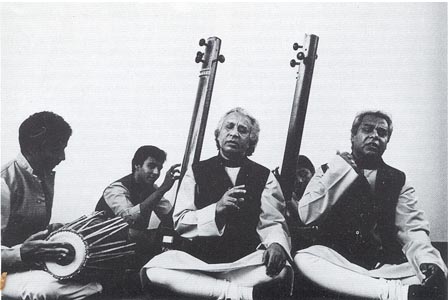|
The
Classical Music of North India
The Dhrupad Tradition

Excerpt from
an Interview with Nikhil Banerjee
11/9/85
You know this is a very
important thing for Westerners to understand about Indian music:
Indian music is based on spiritualism, that is the first word,
you must keep it in your mind. Many people misunderstand and
think it's got something to do with religion, no, absolutely no!
Nothing to do with religion, but spiritualism-Indian music
was practiced and learned to know the Supreme Truth. Mirabai,
Tyagaraja from the South, Haridas Swami, Baiju-all these great
composers and musicians were wandering saints; they never came
into society nor performed in society.
This is the history of Indian music, and this music was learned
and it was practiced in search of truth. This is the background
of Indian classical music; you must keep it in your mind always.
In the temples, this music was sung every day in front of the
statues, the idols. In Mathura-Brindaban, the home of dhrupad,
this music is still sung. Another technical point I can tell you
here: you know dhrupad has got four parts, asthai, antara,
sanchari and abhog. But if you go to Mathura-Brindaban, they
have got seven parts, and you cannot deny they are the
originals. After the evening worship of the idols they sing in a
group, purely based on rag and purely dhrupad with seven parts.
If you really want to hear that, you've got to go there to the
temple. Our music was either practiced by the wandering saints
or it was in the temple. This is the background of Indian
classical music, it was coming like that for many thousands of
years. Then during the Muslim invasion of India in the 12th
century, the music was composed and was sung in front of
the kings to entertain. Then the passion came in our music;
actually it was not there before. Passion and the worship of
kings-the king is next to god-the wording of many old
compositions you'll see, are all in praise of the king. And the
king used to give orders, "Do this, do that." So music
became part of entertainment after the Muslim invasions, before
that no,
absolutely no. Old compositions are all about Lord Krishna and
Radha, their eternal love, all are based on this love affair,
but when the Muslim invasion started then it took a dramatic
change.
From the 12th century Indian classical music was bifurcated: one
went to the North, one went to the South. The South preserved
this rigid orthodoxy; it's still a long argument but they claim
that they have maintained the purity of Indian classical music.
If you keep something from any touch of the outside world
perhaps that sanctity is there but it is like stagnant water.
That broadness doesn't come, whereas in North Indian music,
after so many invasions from Persia, Greece, Afghanistan, and so
many other places, it was enriched with different combinations.
That is one of the reasons why this music being so old still has
got its power, whereas in Japan, China, Korea, and all these
places with old civilizations, it has almost dried out. The
North Indian music is always flowing, and still today also it is
flowing very nicely, like "a rolling stone gathers no
moss." It is very crystalline,
and still full of power. Indian musicians have heard many other
kinds of music, and have tried to take something from other
music also, and they're still seeking. That's a very good point,
I think. I like this. Unless you take some ideas from different
cultures or different people, how can you really enrich your own
ideas? If you do not expand, that means death and stagnation. So
what happened to our South Indian music is really a great
point to think about. Nowadays there are many great musicians,
of course, but many of them are trying to take something from
North Indian music. But perhaps you know many great musicians
who often visit the U.S. are not accepted there in South India.
Why? Because they have gone to the West, because they have heard
other music; it's a very orthodox style. However, in
North Indian music that constant flow is there.
MP3
from another interview with Nikhil Bannerjee
|

